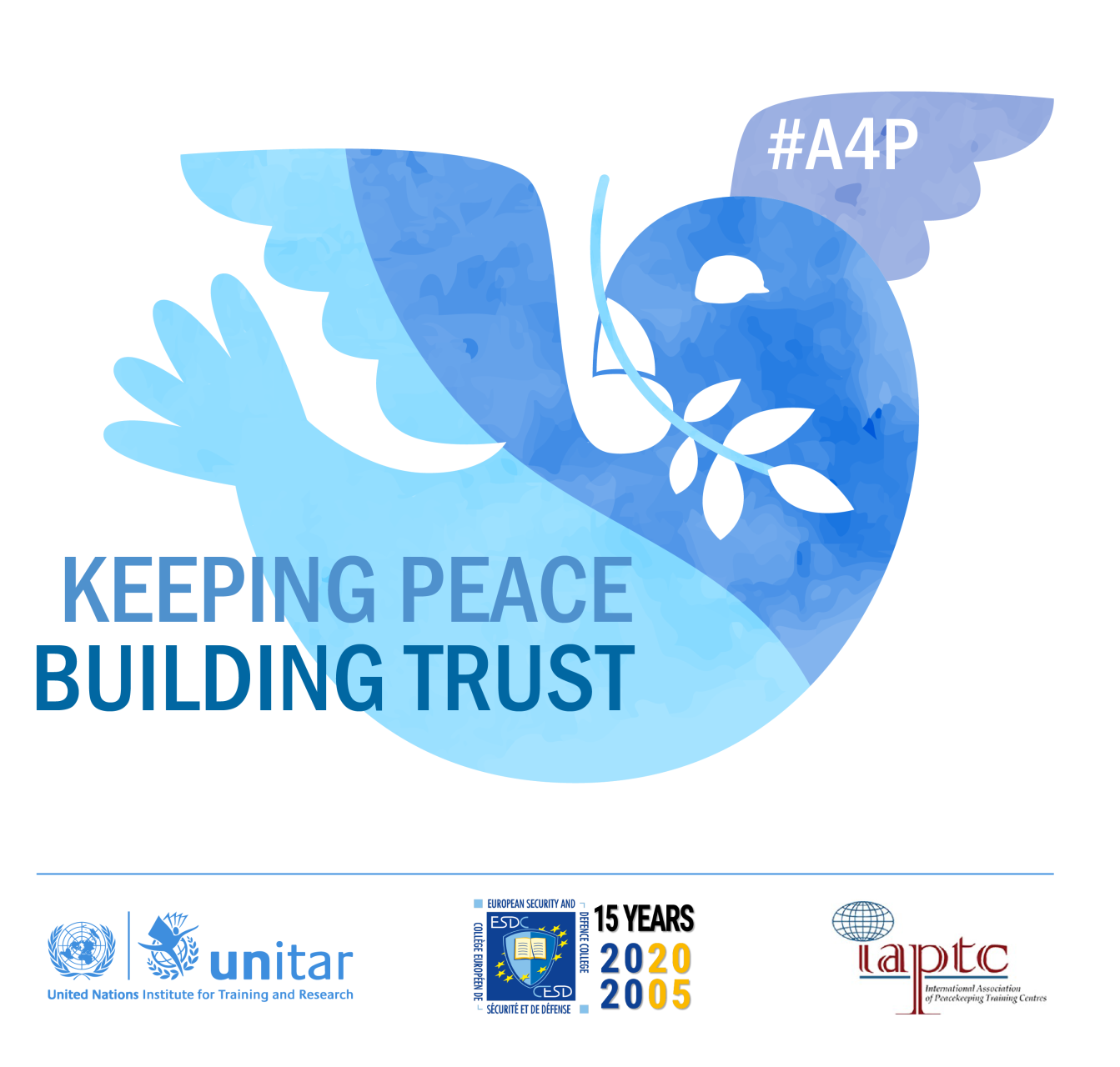
Keeping Peace, Building Trust: Leading peace operations in the post-COVID world
International Association of Peacekeeping Training Centres (IAPTC), European Security and Defence College (ESDC)
- Highlight the importance of expert mission leadership for the effectiveness of and trust in peace operations;
- Showcase new innovative and inclusive approaches to leadership training, including COVID-19 adaptations;
- Bring together key peacekeeping actors for pooling of expertise and resources as well as forging new partnerships;
- Explore and integrate different perspectives on peacekeeping leadership and training with a view of strengthening international and regional cooperation in this area.
Trust is one of the most potent tools that has an incredible power to connect, inspire, motivate and encourage action at any level and scale; yet trust is one of the most fragile ones, easy to undermine but difficult to restore. In September 2019, just on the brink of the global health crisis, the United Nations General Assembly proclaimed 2021 the International Year of Peace and Trust (GA Resolution 73/338), recognising the indispensable role that global peace and trust play in the achievement of sustainable development, and encouraging the international community to conduct educational and public awareness-raising activities in order to disseminate the advantages of both. At that time, it was hard to imagine how timely and necessary this call would be for all of us today.
2020 presented a serious challenge to leaders and institutions globally who faced a sudden need to navigate through the unprecedented and unpredictable conditions. The failure to adequately protect the different parts of population against COVID-19 as well as to reconcile their at times opposing needs created new and activated existing triggers of distrust and, in worse cases, unrest. Against this backdrop, restoring the weakened bonds and connections should be the primary focus of our common strategy to build back better after the crisis.
Maintaining trust in the face of rapidly and reversely changing circumstances is a very familiar challenge for those continuously working in conflict-affected and fragile contexts. This becomes even more important and even more difficult when the context is foreign – like in the case of UN peacekeeping. The current and future position of the UN in preventing and resolving conflicts in this climate of persistently decreasing trust has been specifically addressed by Alan Doss, a special advisor to and the former President of the Kofi Annan Foundation, in his recent book “Peacekeeper in Africa: Learning from UN Interventions in Other People's Wars” (2020). Analysing past successes and failures of UN peace operations, the author further stresses the role of leadership in peacekeeping missions to successfully guide peacebuilding efforts in conflict-torn communities.
Today, as the world is slowly emerging out of the biggest shocks of the 21st century, how do we cure the remaining “trust deficit disorder”? In a climate where multilateralism and its core institutions are simultaneously indispensable and put under question, how do we restore and protect our “most previous value” – the one of peace?
Building on the important connections between competent leadership and populations’ trust in multilateralism, highlighted by Alan Doss, UNITAR would like to use the occasion of the International Day of UN Peacekeepers 2021 to initiate a deep and inclusive conversation about the various aspects of mission leadership and the ways it should be approached to effectively align with the most recent trends and demands of the ever-evolving environment. In line with the cornerstone document of UN peacekeeping – Action for Peacekeeping that highlights the importance of training as well as high leadership performance for the success of missions, and the UN75 Final Report that stresses the persistent need to improve the selection and training of peacekeepers for the promotion of peace, UNITAR and its main event partner – European Security and Defence College (ESDC) – will come together with the major peacekeeping training institutions as well as other stakeholders to conduct a multisectoral, multidimensional, retrospective and forward-looking analysis of the status quo, the needs and the ways to address them in order to create lasting, relevant and resilient peace.
The conference is organised within the framework of the 26th Annual Conference of the International Association of Peacekeeping Training Centres (IAPTC) that is taking the form of a series of targeted web-based events under the responsibility of the IAPTC network members. UNITAR bears the full responsibility for the conduction of this event. The event directly supports Sustainable Development Goals 16 (Peace, Justice and Strong Institutions), 5 (Gender Equality) and 17 (Partnerships for Development).
Main theme: Leadership in peace operations as an essential element for restoring peace and trust
Sub-themes:
- Pre-deployment training: A basis for effective leadership & impact of COVID-19
- UN and EU: Learning from each other’s experience for stronger peacekeeping
- Women’s leadership for peace
- COVID-19: Crisis leadership and restoring trust to build back better
The event will be hosted via Zoom.
Training institutions in peacekeeping and security sector at all levels, related UN institutions and officials, policymakers (specifically from the EU countries), researchers, broader public.
Partners:
- International Association of Peacekeeping Training Centres (IAPTC)
- European Security and Defence College (ESDC) – co-organiser
Full line-up will be announced in the coming weeks.

